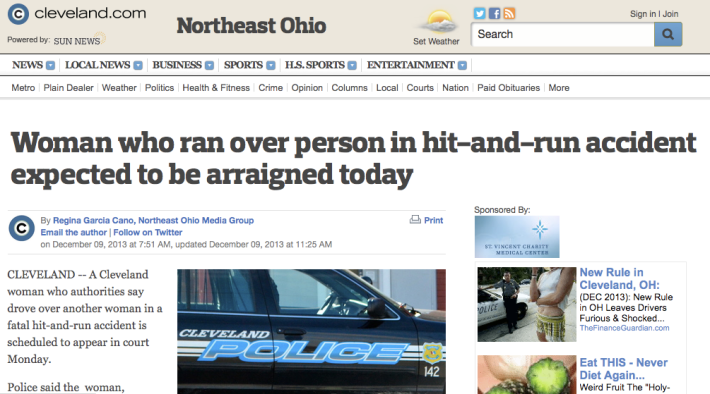
Earlier this year, the NYPD adopted a policy to stop using the term "accident" to describe traffic collisions. The San Francisco police department made similar changes a few months later. The problem with the term "accident," of course, is that it implies no one was at fault -- that traffic injuries and deaths are just random, unpreventable occurrences. It's part of a cultural permissiveness toward dangerous driving, which in turn contributes to the loss of life.
News media, however, have been slower than police to acknowledge the shortcomings of the term "accident." While even NYC Police Commissioner Ray Kelly, notorious for turning a blind eye to traffic violence, issued a statement that "the term 'accident' has sometimes given the inaccurate impression or connotation that there is no fault or liability associated with a specific event," major press outlets like the New York Times and the Cleveland Plain Dealer still tend to use "accident" as the default term for car crashes, even in vehicular homicide cases.
One journalism institution could change that. The Associated Press produces the preeminent style guide for journalists, a reference used by news outlets around the country and around the world. While the AP has acknowledged the inherent problems with the term "accident," it has yet to issue clear guidelines for journalists that would prevent the imprecise term from tacitly excusing thousands of deaths every year.
In its style guide, the Associated Press has no entry for "accident," "collision," or "crash." However, in a supplemental guide for journalists called "Ask the Editor," the AP advises journalists against using the term "accident."
In one entry, a reporter asks editor David Minthorn: "I've always written traffic 'crash,' not 'accident' because the latter seems to imply no fault. But increasingly I see people calling crashes accidents. Does it matter?"
Minthorn responds: "Yes, avoid terms that might suggest a conclusion." So there you have it, right? Not quite.
Not only is there no entry about "accident" in the AP Style Guide itself, some passages in the guide don't even heed Minthorn's advice. The AP Style Guide entry for "Total, Totaling, Totaled," for example, states: "The phrase 'a total of' often is redundant. It may be used, however, to avoid a figure at the start of a sentence: A total of 650 people were killed in holiday traffic accidents."
The term also appears under the "Publication: Privacy" guidelines: "Another example of spot news interest: A child was injured in an auto accident in Alabama. A newspaper took a picture of the scene ..."
There's a simple alternative, which the big city police departments are adopting and which editors like Minthorn must be aware of. The term "collision" is nearly a perfect substitute for "accident," without implying a lack of causality. (In fact, when I was a very young newspaper reporter, an editor of mine recommended "collision.")
Words matter, and the way car crashes are framed has a powerful effect on how they are perceived. If thousands of preventable traffic injuries and deaths per year are described as accidental, why support thorough investigations to uncover causal factors and determine potential solutions?
The Associated Press updates its style guide annually to reflect evolving cultural norms. For example, in 2008 the AP revised the guide to recommend the term "gay" as opposed to "homosexual," following a campaign by advocates for LGBT rights.
These adjustments recognize the importance of language in making sense of our world. Adding an entry in the Associated Press Style Guide that clearly positions "collision" as the preferred term, instead of "accident," would shape perceptions of traffic violence and, over time, make American streets safer.





